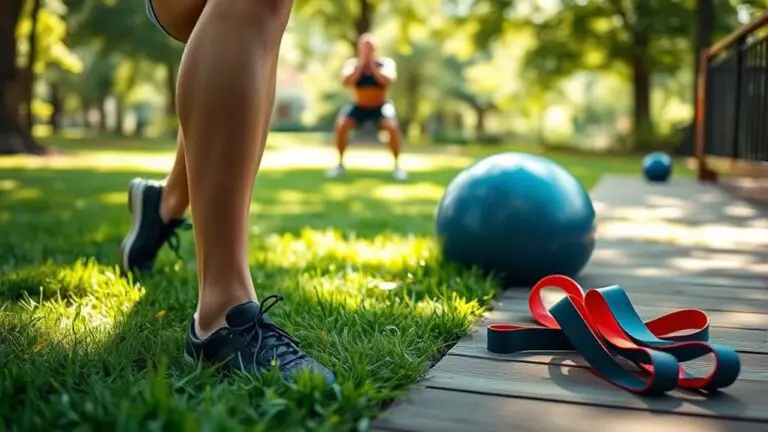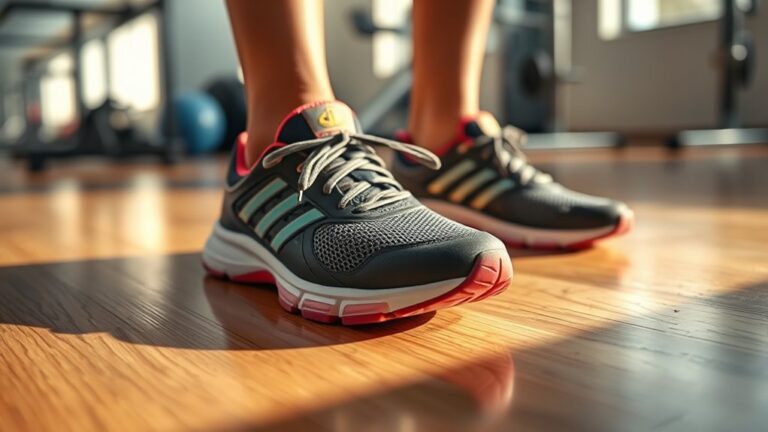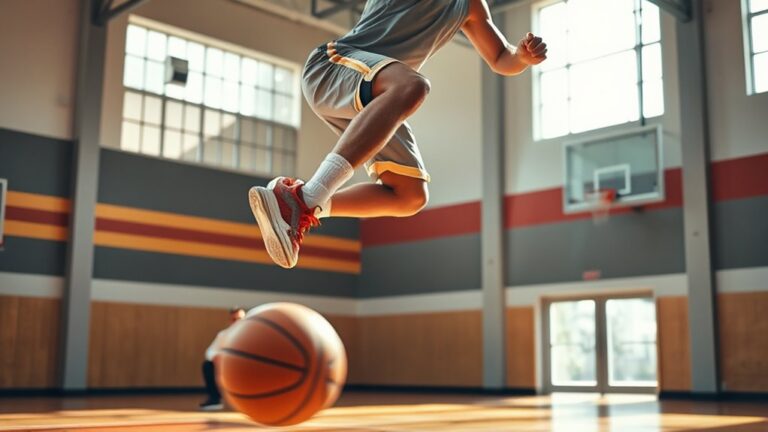How to Use Acupuncture for Gym Recovery and Performance
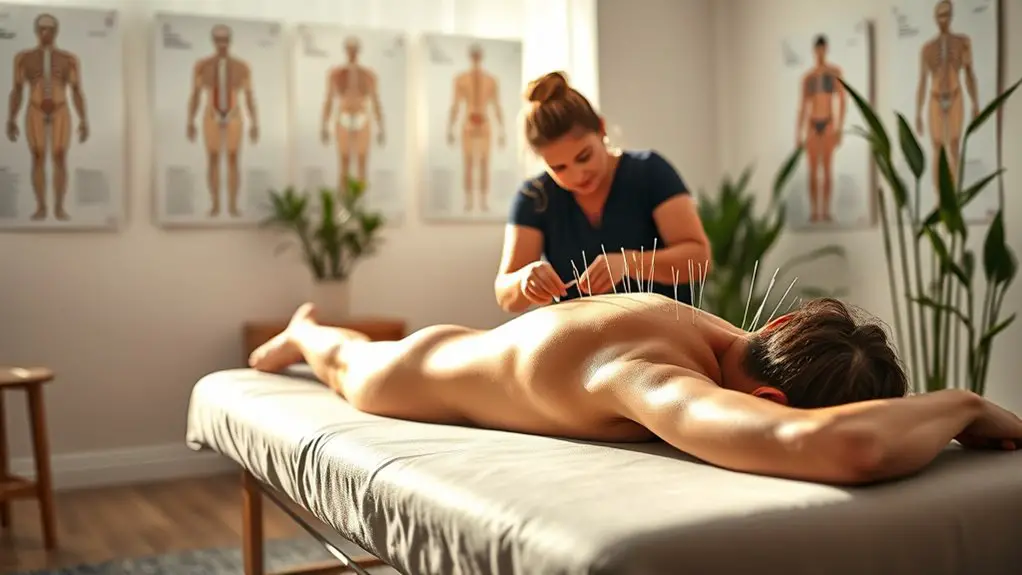
Using acupuncture for gym recovery and performance can greatly enhance your training outcomes. It reduces muscle soreness, speeds up healing, and improves flexibility, allowing for quicker recovery after workouts. Techniques like dry needling and electro acupuncture target muscle tension and inflammation, stimulating blood flow and promoting healing. Regular sessions may even boost your endurance and reduce fatigue. To optimize your performance, exploring different acupuncture approaches can be beneficial, as there’s more to discover about integrating it into your routine.
Understanding Acupuncture and Its Benefits for Athletes

When you’re pushing your body to its limits in the gym, recovery becomes essential, and acupuncture can be a powerful tool in that process. This ancient practice offers a benefits overview specifically for athletes, enhancing recovery and performance. Research indicates that acupuncture can reduce muscle soreness, improve range of motion, and accelerate healing by promoting blood flow and decreasing inflammation.
Athlete testimonials frequently highlight its effectiveness; many report quicker recovery times and reduced injury rates after incorporating acupuncture into their routines. For instance, professional runners and weightlifters have noted significant improvements in their overall well-being and performance metrics post-treatment.
How Acupuncture Aids in Muscle Recovery
Acupuncture plays a significant role in muscle recovery by targeting specific points that promote healing and alleviate tension. This ancient practice can effectively address muscle soreness and enhance your overall performance. Here’s how acupuncture can aid in your recovery:
Acupuncture aids muscle recovery by promoting healing, reducing soreness, and enhancing overall performance.
- Reduces inflammation and promotes blood flow
- Relieves muscle soreness and stiffness
- Enhances range of motion and flexibility
- Supports injury prevention by addressing imbalances
The Science Behind Acupuncture and Performance Enhancement
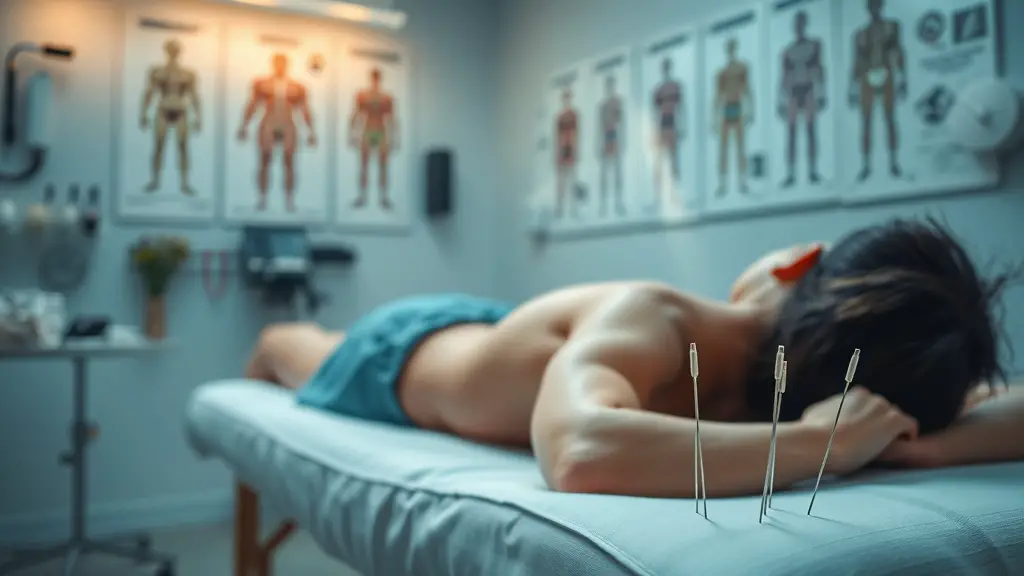
While many athletes seek various methods to enhance their performance, the science behind acupuncture reveals its potential to optimize physical capabilities and support recovery. Research indicates that acupuncture stimulates neurotransmitter release, including endorphins and serotonin, which play vital roles in mood enhancement and pain management. This biochemical response not only alleviates discomfort but also promotes a state conducive to peak performance.
Moreover, acupuncture can improve blood flow and reduce inflammation, allowing for quicker recovery from workouts. By addressing both physical and psychological aspects, acupuncture creates a holistic approach to performance enhancement. Studies show that regular sessions may lead to increased endurance, improved flexibility, and reduced fatigue during training.
Incorporating acupuncture into your routine could offer a competitive edge, helping you recover faster and perform better. By understanding the science behind these benefits, you can make informed decisions about your training regimen.
Types of Acupuncture Techniques for Gym Recovery
Exploring various acupuncture techniques can greatly enhance your gym recovery process. Each method targets specific issues, helping you bounce back faster and improve performance. Here are some effective techniques to examine:
- Dry Needling: Focuses on trigger points, releasing muscle tension and alleviating pain.
- Electro Acupuncture: Uses electrical currents with needles to stimulate deeper tissues, enhancing blood flow and reducing recovery time.
- Traditional Chinese Acupuncture: Balances energy flow, promoting overall wellness and aiding in recovery from fatigue.
- Auricular Acupuncture: Targets ear points to manage stress and improve mental clarity, beneficial for athletes.
Incorporating these techniques into your recovery routine can optimize your muscle recovery, reduce soreness, and enhance your overall performance. It’s crucial to consult a qualified practitioner to tailor the treatment to your specific needs and goals.
Integrating Acupuncture Into Your Post-Workout Routine

To effectively integrate acupuncture into your post-workout routine, consider timing and technique as critical factors in maximizing recovery. Aim for acupuncture sessions within two hours after your workout, as this is when your body is primed for healing and muscle repair. Utilizing acupuncture timing in this way can enhance blood flow, reduce inflammation, and promote muscle recovery.
Incorporate techniques like body point acupuncture to target specific muscle groups that experienced strain during your workout. This can facilitate post workout relaxation, helping to alleviate tension and soreness. Additionally, consider combining acupuncture with other recovery methods, such as hydration and nutrition, for a holistic approach.
To optimize results, listen to your body and adjust your acupuncture frequency based on your training intensity. With the right integration, acupuncture can be a powerful ally in your fitness journey, enhancing both recovery and overall performance.
Choosing the Right Acupuncturist for Your Fitness Needs
When you’re choosing an acupuncturist for your fitness needs, start by checking their credentials and experience in sports medicine. It’s essential to find someone who specializes in athletic recovery to guarantee they understand your specific demands. Additionally, your comfort and personal compatibility with the practitioner can greatly impact your overall recovery experience.
Credentials and Experience
Selecting the right acupuncturist is essential for optimizing your gym recovery, and understanding their credentials and experience can make all the difference. Here are key factors to take into account during your selection process:
- Credentials Verification: Verify they’re licensed and certified in acupuncture.
- Experience Assessment: Look for practitioners with a focus on sports recovery and performance enhancement.
- Patient Reviews: Read testimonials from athletes or fitness enthusiasts who’ve benefited.
- Specialized Training: Check if they’ve pursued additional training in relevant areas like pain management or rehabilitation.
Specialization in Sports Medicine
Finding an acupuncturist with a specialization in sports medicine can greatly enhance your recovery process. Sports acupuncture targets specific points to improve blood flow, reduce inflammation, and promote healing, making it particularly beneficial for athletes. When searching for an acupuncturist, look for someone who understands the unique demands of your sport and can tailor treatment plans for injury prevention and performance enhancement. They should be familiar with common sports injuries and how acupuncture can aid in faster recovery. This specialization not only helps in addressing existing injuries but also in developing strategies to prevent future ones. With the right practitioner, you can optimize your training, reduce downtime, and enhance your overall athletic performance.
Personal Compatibility and Comfort
Choosing an acupuncturist who aligns with your personal comfort and compatibility can greatly influence the effectiveness of your recovery process. It’s crucial to take into account your personal preferences and comfort levels when selecting a practitioner. Here are some factors to keep in mind:
- Experience with athletes: Look for an acupuncturist familiar with sports injuries and recovery.
- Treatment style: Verify their approach resonates with your comfort and goals.
- Communication: A practitioner who listens and addresses your concerns can enhance trust.
- Cleanliness and environment: A welcoming, hygienic space can greatly impact your comfort levels.
Frequently Asked Questions
Is Acupuncture Safe for Everyone, Including Beginners and Non-Athletes?
Yes, acupuncture’s generally safe for everyone, including beginners and non-athletes. Many people mistakenly believe it’s only for athletes or specific conditions, but its benefits extend to stress relief and overall wellness. Research shows acupuncture can help with pain management and recovery, making it a valuable tool for anyone. Always consult a qualified practitioner to address your individual needs and concerns, ensuring you receive the best and safest treatment possible.
How Often Should I Get Acupuncture for Optimal Recovery?
Imagine your body as a finely tuned instrument, each string needing just the right tension. For ideal recovery, consider acupuncture frequency; many find once a week beneficial. This rhythm allows your body to restore balance, releasing recovery benefits that enhance your performance. As you progress, you might adjust the frequency based on your needs and goals. Listening to your body’s signals can help you find that perfect harmony for ultimate recovery.
Can Acupuncture Replace Traditional Physical Therapy?
Acupuncture can’t fully replace traditional physical therapy, but it can complement it. You’ll find acupuncture benefits include pain relief, improved circulation, and reduced inflammation, which can enhance your overall recovery process. However, physical therapy provides targeted rehabilitation for specific injuries and movement dysfunctions. Combining both approaches can optimize your performance and recovery, giving you a well-rounded strategy that addresses both immediate and long-term health needs effectively.
Are There Any Side Effects Associated With Acupuncture?
Acupuncture isn’t without its treatment risks, though they’re generally minimal. Some people might experience mild side effects like bruising, soreness, or fatigue. It’s important to separate acupuncture myths from reality; when performed by a qualified practitioner, serious complications are rare. You should always consult with your healthcare provider before starting any new treatment, ensuring it aligns with your performance goals and overall health. Being informed can help you maximize the benefits while minimizing risks.
How Long Does an Acupuncture Session Typically Last?
Imagine it’s a world where time stands still, and you’re floating in relaxation. An acupuncture session typically lasts between 30 to 90 minutes, depending on your specific needs and the treatment’s intensity. This session duration allows for thorough assessment and treatment, maximizing your recovery. For ideal results, treatment frequency can range from once a week to multiple times a week, tailored to enhance your performance and overall well-being.


